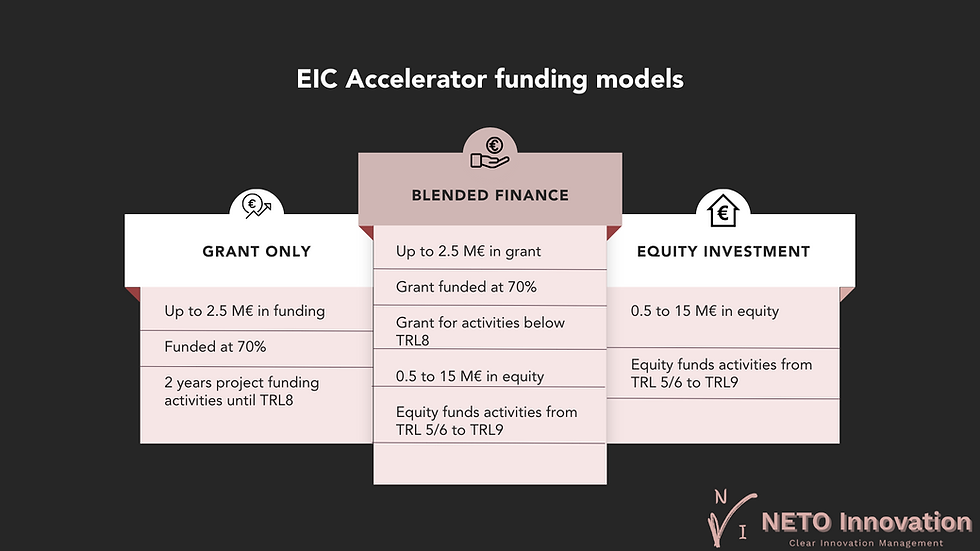The role of innovation managers in ensuring project success
- Sara

- Nov 18, 2024
- 7 min read
In today’s rapidly evolving landscape of European-funded projects, managing innovation effectively is critical to achieving success. From Horizon Europe to the EIC Accelerator, securing funding is just the beginning. Ensuring a project runs smoothly, meets its objectives, and delivers meaningful impact requires more than just technical expertise—it demands skilled innovation management. In this blog, we explore the pivotal role of innovation managers in driving project success, from shaping proposals to managing complex consortia, and ensuring long-term sustainability. Discover why having an experienced innovation manager can make all the difference for your next European project.
European-funded projects, such as those under Horizon Europe and the EIC Accelerator, play a pivotal role in advancing innovation across a wide range of industries. These programs provide critical support for groundbreaking research and development, but they come with increasing complexity. Projects often involve large, multidisciplinary consortia, strict regulatory requirements, and a need to demonstrate both scientific excellence and socio-economic impact.
Successfully navigating these projects requires more than just strong technical or scientific knowledge. Professional project management is essential to ensure that timelines, resources, and partnerships are effectively managed. As projects grow in size and scope, the role of innovation managers has become increasingly important. Innovation managers bring a strategic approach to managing the complexities of these initiatives, ensuring that all aspects—from proposal development to impact delivery—are aligned and executed efficiently. In this blog, we explore how innovation managers drive success in European-funded projects and why they are indispensable to achieving meaningful outcomes.
At NETO Innovation, our innovation managers have extensive experience in diverse fields such as materials science, printed electronics, low-carbon technologies, and healthcare. Their multifaceted expertise allows them to tailor strategies that align with the specific requirements of different European funding schemes, from Horizon Europe to EIC and beyond.
The role of innovation managers in ensuring project success

In the landscape of European-funded projects, securing funding is just the beginning. The real challenge lies in executing the project successfully, delivering on objectives, and creating long-term impact. Whether it's Horizon Europe, the EIC Accelerator, or other European initiatives, the complexity of these programs requires more than just technical expertise. Effective project management is essential, and innovation managers play a critical role in ensuring that projects run smoothly, achieve their goals, and deliver lasting results.
Innovation managers are responsible for guiding the project from concept to completion. Their expertise lies not only in managing the day-to-day operations but also in aligning the project’s vision with the strategic objectives of the funding bodies. In this blog, we will explore how innovation managers contribute to every stage of the project lifecycle—from proposal development to impact assessment—and why they are indispensable to the success of European-funded projects.
Proposal phase: laying the foundation

The proposal phase is one of the most crucial stages of any European project. It’s here that the project’s vision is defined, the objectives are set, and the roadmap for execution is developed. Innovation managers play a vital role in this phase by shaping a compelling proposal that aligns with the requirements of the funding call.
One of the first tasks is identifying the right funding opportunity. European programs like Horizon Europe and the EIC Accelerator offer numerous calls for proposals, each with specific themes and objectives. Innovation managers help organizations identify the best-fit funding opportunities, ensuring that their project idea aligns with the priorities of the funding scheme.
Once the opportunity is identified, the innovation manager works closely with the technical and business teams to shape the project’s objectives. This involves translating complex scientific or technical concepts into a clear, strategic vision that meets the goals of the funding call. A well-structured proposal not only highlights the innovation potential but also addresses the societal and economic impacts, which are key criteria for evaluation in many European programs.
Building a strong consortium is another essential task. European-funded projects often require collaboration between multiple partners across different sectors and countries. Innovation managers are responsible for identifying the right partners and ensuring that their expertise complements the project’s objectives. A balanced and diverse consortium strengthens the proposal and increases the likelihood of success.
Finally, innovation managers oversee the proposal writing process, ensuring that each section—whether it’s on excellence, impact, or implementation—is well-articulated and aligned with the evaluation criteria. They manage the submission process, ensuring that the proposal is complete, compliant, and submitted on time.
Project management: keeping the project on track
Once the project is funded, the innovation manager’s role shifts to execution. Managing a European project is no small feat, particularly when dealing with large consortia and complex deliverables. The innovation manager serves as the central point of coordination, ensuring that all partners are aligned and that the project stays on schedule and within budget.
One of the first tasks is organizing the project kickoff. This meeting is critical for setting expectations, assigning roles, and establishing communication channels between partners. A well-structured kickoff ensures that everyone understands the project’s objectives, timelines, and deliverables from the outset.
Resource allocation and time management are key responsibilities during this phase. Innovation managers must ensure that both financial and human resources are appropriately allocated across work packages, avoiding bottlenecks that could delay the project. They track progress against the project timeline, ensuring that all milestones and deliverables are met on time.

Risk management is another essential aspect of the innovation manager’s role. Every project carries risks, whether they are technical, financial, or regulatory. Innovation managers are responsible for identifying these risks early and developing strategies to mitigate them. By anticipating potential issues and addressing them proactively, they help keep the project on track and prevent costly delays.
Regular communication and reporting are also critical. European-funded projects require frequent updates to funding bodies, particularly in programs like Horizon Europe, where detailed technical and financial reporting is mandatory. Innovation managers ensure that these reports are submitted on time and meet the necessary requirements, keeping the funding bodies informed of the project’s progress.
Collaboration and communication: aligning stakeholders
Effective collaboration is at the heart of any successful European project. With multiple partners involved, often from different countries and sectors, maintaining clear and transparent communication is essential. Innovation managers play a key role in facilitating this communication, ensuring that all stakeholders are aligned and that any issues are addressed promptly.
Stakeholder management involves coordinating between the project’s internal teams, external partners, and funding bodies. Innovation managers serve as the main point of contact, ensuring that information flows smoothly between all parties. Regular consortium meetings, progress updates, and feedback loops help keep the project on track and ensure that any challenges are addressed collectively.
Keeping the consortium motivated and aligned with the project’s objectives is also crucial. Innovation projects can be long and complex, and it’s easy for partners to lose focus or momentum. Innovation managers ensure that all partners remain engaged and committed to the project’s success, fostering a collaborative and productive working environment.
Monitoring and measuring success: delivering impact

One of the most important responsibilities of an innovation manager is ensuring that the project delivers on its promised outcomes. European funding programs place a strong emphasis on impact—both societal and economic. Innovation managers are responsible for tracking the project’s progress against key performance indicators (KPIs) and ensuring that all deliverables are met on time.
Performance tracking involves monitoring the progress of each work package and ensuring that all milestones are achieved according to the project plan. Innovation managers conduct regular reviews to assess progress and make adjustments as necessary to keep the project on track.
In addition to meeting technical goals, innovation managers must also assess the project’s broader impact. For European projects, this often includes demonstrating how the project contributes to societal challenges, such as climate change, digital transformation, or public health. Innovation managers ensure that the project’s impact is clearly articulated and that it aligns with the goals of the funding body.
Finally, innovation managers are responsible for preparing the project’s final reports and ensuring that all outcomes are disseminated to the relevant stakeholders. This includes not only the funding bodies but also the wider public, industry, and scientific communities. Effective dissemination and exploitation of results are key to ensuring that the project’s innovations are brought to market or integrated into future research and development efforts.
At NETO Innovation, we understand the challenges that come with managing complex European projects. Our team of skilled innovation managers is dedicated to helping organizations navigate the intricacies of programs like Horizon Europe, Innovation fund, and the EIC Accelerator.
Our expertise spans a wide range of industries, including materials science, printed electronics, low-carbon technologies, and healthcare. We specialize in managing the entire project lifecycle—from identifying the right funding opportunity and building a strong consortium, to ensuring successful project execution and delivering long-term impact.
At NETO Innovation, we pride ourselves on our hands-on approach to innovation management. Our team works closely with our clients to develop tailored strategies that align with their goals and the specific requirements of the funding program. We ensure that every project we manage is delivered on time, within budget, and with measurable impact, helping our clients achieve lasting success in the competitive landscape of European-funded projects.
Conclusion
Innovation managers play a vital role in the success of European-funded projects. From shaping the initial proposal to managing the project’s execution and ensuring long-term impact, their expertise is indispensable. The complexity of programs like Horizon Europe, the EIC Accelerator, and others requires not just technical and scientific knowledge but strategic project management that keeps everything on track.
NETO Innovation is committed to providing this level of expertise to every project we manage. By partnering with experienced innovation managers, organizations can navigate the complexities of European funding and achieve sustainable, impactful results. Whether you are preparing a new proposal or managing an ongoing project, the role of an innovation manager is crucial to ensuring your project's success.
References:
Gallagher, S. Time, risk, and innovation: creating space in your day to solve meaningful problems. Paper presented at PMI® Global Congress 2015—EMEA, London, England. Newtown Square, PA: Project Management Institute, 2015.
Kumar, V. S. Project managers as creative and innovative leaders. Paper presented at PMI® Global Congress 2012—North America, Vancouver, British Columbia, Canada. Newtown Square, PA: Project Management Institute, 2012
The Leader's Guide to Lateral Thinking Skills: Unlocking the Creativity and Innovation in You and Your Team, by Paul Sloane
Connect with us on LinkedIn for more insightful content.





Comments